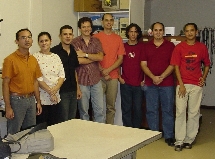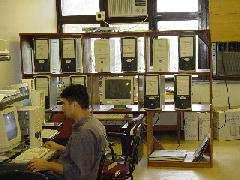 Hi. I'm Aldebaro Klautau. I recently joined the Federal
University of Para (UFPA) in Brazil after graduating with
my Ph.D. from University of California at San Diego.
I am part of LaPS, the Signal Processing Laboratory,
at UFPA. LaPS promotes research in digital signal
processing (DSP), which includes speech recognition, image coding, seismic
signals and DSP techniques for monitoring power systems. LaPS was created in
1993 and is one of the research laboratories of the Electrical and Computer
Engineering Department at UFPA. UFPA is the Brazilian public federal
university with the largest number of undergrad students, and is located in
Belem, a city close to the Amazon forest in North Brazil.
Hi. I'm Aldebaro Klautau. I recently joined the Federal
University of Para (UFPA) in Brazil after graduating with
my Ph.D. from University of California at San Diego.
I am part of LaPS, the Signal Processing Laboratory,
at UFPA. LaPS promotes research in digital signal
processing (DSP), which includes speech recognition, image coding, seismic
signals and DSP techniques for monitoring power systems. LaPS was created in
1993 and is one of the research laboratories of the Electrical and Computer
Engineering Department at UFPA. UFPA is the Brazilian public federal
university with the largest number of undergrad students, and is located in
Belem, a city close to the Amazon forest in North Brazil.
Three faculty members and more than 30 students (grad and undergrad) are affiliated with the lab, which is funded by Governmental agencies such as CNPq and CAPES, and companies such as ELETRONORTE and CELPA. Current projects target robust speech recognition, speaker verification based on support vector machines, DSP applied to predictive maintenance of circuit breakers and image coding based on wavelets. Our current plans include two things:
 A good overview of MLLR and other such adaptation techniques
can be found here:
A good overview of MLLR and other such adaptation techniques
can be found here:

Our second task will be the implementation of a particular approach to discriminative training known as MMIE. In addition to the textbook cited above, here is a useful overview of discriminative approaches to HMM training. More details will follow on this in the fall. If you want to know more about our work or our lab, feel free to contact me at aldebaro@ufpa.br.
|